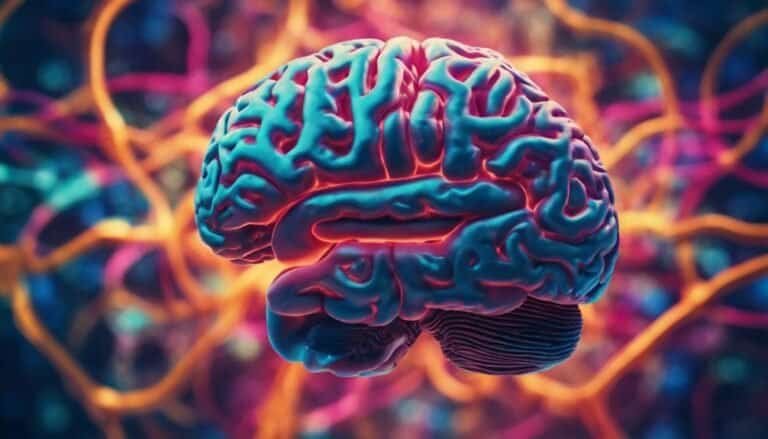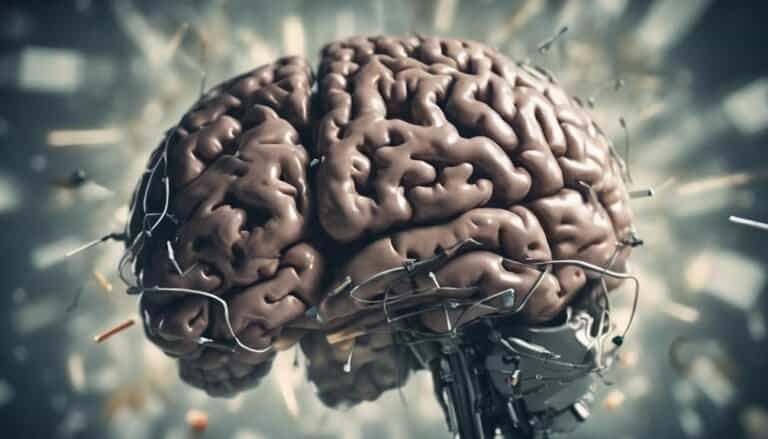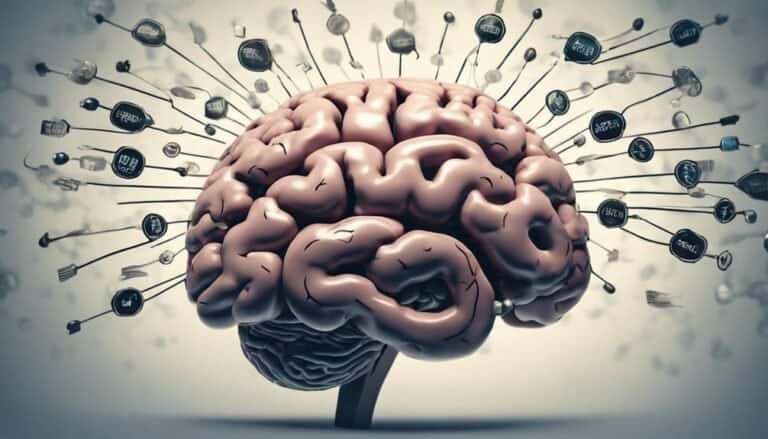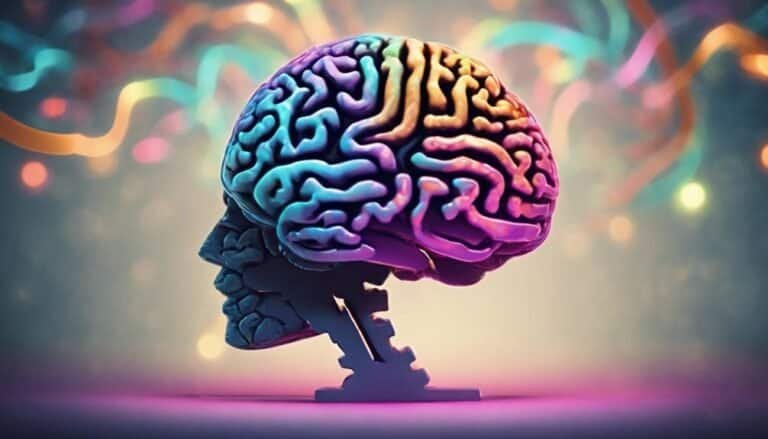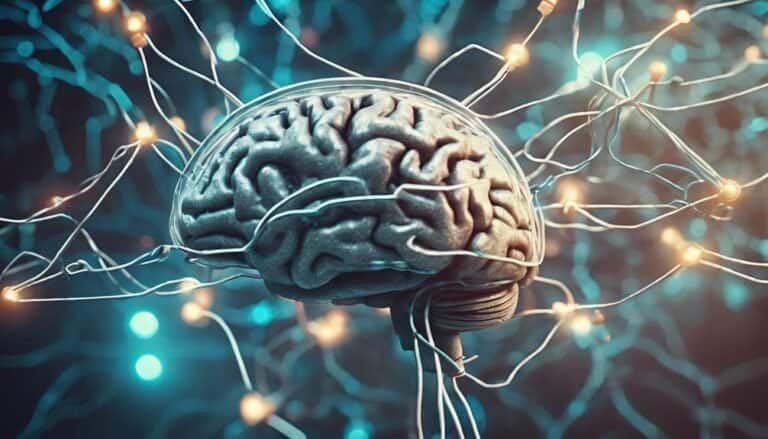Brain and the Pathway to Personal Growth
|
Getting your Trinity Audio player ready...
|
Imagine your brain as a garden where seeds of knowledge are constantly planted. Just like a gardener tends to the soil, nurturing it to yield a bountiful harvest, your brain also requires care and attention to foster personal growth.
But how exactly does this intricate organ pave the way for your development? Explore the fascinating interplay between your brain and the journey towards self-improvement, uncovering the untapped potential that lies within the neural pathways awaiting exploration.
Key Takeaways
- Brain rewiring facilitates personal transformation and growth.
- Cognitive restructuring leads to a positive mindset and improved actions.
- Emotional intelligence enhances relationships and decision-making skills.
- Behavior change through habit formation leverages brain chemistry for positive outcomes.
The Brain's Role in Growth
Understanding how your brain actively contributes to personal growth is essential for realizing your full potential. The intricate web of neural connections within your brain plays a crucial role in shaping your experiences and behaviors. When you adopt a growth mindset, you open yourself up to new possibilities and challenges, allowing your brain to forge new pathways and connections. By embracing the belief that your abilities can be developed through dedication and hard work, you empower your brain to adapt and learn from every experience.
Your brain is remarkably adept at rewiring itself in response to new information and experiences. With a growth mindset, you can harness this neuroplasticity to drive personal development. As you challenge yourself and step out of your comfort zone, you stimulate the growth of new neural connections, enhancing your cognitive abilities and expanding your potential. Embracing a growth mindset not only fuels your personal growth but also nurtures a sense of resilience and perseverance in the face of obstacles. Engage your brain in the pursuit of growth, and watch as new possibilities unfold before you.
Neuroplasticity and Personal Development
Neuroplasticity, the brain's remarkable ability to rewire itself in response to new experiences, is a key factor in driving personal development and growth. Understanding brain plasticity can empower you to cultivate resilience and embark on a transformative journey towards self-improvement. By actively engaging in activities that challenge your current neural pathways, you pave the way for new connections to form, leading to personal transformation.
| Benefits of Brain Plasticity | Description | Impact |
|---|---|---|
| Increased Resilience | Adapting to new situations becomes easier as your brain learns to adjust and bounce back from challenges. | Enhances your ability to cope with adversity and setbacks, fostering personal growth. |
| Enhanced Neural Pathways | By creating new connections in the brain through learning and experiences, you expand your cognitive abilities and potential. | Facilitates the development of new skills and perspectives, enriching your personal development journey. |
| Transformational Growth | Embracing neuroplasticity enables you to break free from old habits and thought patterns, paving the way for significant personal growth. | Empowers you to evolve and become the best version of yourself through continuous learning and adaptation. |
Cognitive Functions for Self-Improvement
To further enhance your personal growth journey, exploring the cognitive functions that play a pivotal role in self-improvement can offer valuable insights and strategies for maximizing your potential.
Cognitive restructuring involves changing the way you think about yourself and the world around you. By challenging negative thought patterns and replacing them with more positive and constructive ones, you can reshape your mindset and approach to life. This process can lead to increased self-confidence, resilience, and a more optimistic outlook on challenges.
Behavioral modification is another key aspect of self-improvement that focuses on changing your actions and reactions. By consciously altering your behaviors in response to different situations, you can cultivate healthier habits and responses. This can lead to improved relationships, increased productivity, and a greater sense of control over your life.
Emotional Intelligence and Growth
Enhancing your emotional intelligence is a crucial component of personal growth and development. By honing in on self-awareness techniques and emotional regulation strategies, you can navigate your emotions more effectively, leading to better decision-making and improved relationships. Self-awareness allows you to recognize your own feelings, thoughts, and behaviors, providing a solid foundation for growth. Pairing this with emotional regulation strategies such as deep breathing or mindfulness can help you manage challenging situations with composure.
| Self-Awareness Techniques | Emotional Regulation Strategies | Empathy Building | Social Skills Enhancement |
|---|---|---|---|
| Journaling | Deep Breathing | Active Listening | Conflict Resolution |
| Mindfulness Practices | Meditation | Perspective-taking | Effective Communication |
| Self-Reflection | Physical Exercise | Emotional Support | Collaboration |
Furthermore, empathy building and enhancing social skills are vital aspects of emotional intelligence. Practicing empathy can help you understand others' perspectives, fostering deeper connections and more meaningful interactions. Improving social skills like active listening and effective communication can strengthen your relationships and contribute significantly to personal growth.
Brain Chemistry and Behavior Change
Exploring the intersection of brain chemistry and behavior change reveals the intricate relationship between our neural processes and the way we adapt and grow in response to various stimuli and experiences. The intricate dance of neurotransmitters such as serotonin and dopamine plays a crucial role in shaping our behaviors and influencing personal growth.
- Serotonin Levels: Fluctuations in serotonin levels impact mood regulation, impulse control, and overall emotional well-being.
- Dopamine Release: Dopamine, often associated with reward and pleasure, motivates us to seek out positive experiences and reinforces certain behaviors.
- Neuroplasticity: The brain's ability to reorganize itself by forming new neural connections allows for behavior change and personal growth.
- Feedback Loops: Constant interactions between brain chemistry and behavior create feedback loops that can either reinforce or modify our actions.
Understanding how neurotransmitters like serotonin and dopamine interact with our behaviors provides valuable insights into how we can intentionally leverage our brain chemistry to cultivate positive change and personal development.
Mindfulness Practices for Growth
As you explore the realm of mindfulness practices for growth, consider the power of breathing techniques in fostering personal development. Through intentional focus on your breath, you can create a sense of calm and clarity, paving the way for growth.
Additionally, incorporating meditation into your routine can further enhance self-awareness and emotional regulation, ultimately contributing to your journey of personal growth.
Breathing Techniques for Growth
Engaging in mindful breathing techniques can significantly contribute to personal growth by fostering self-awareness and emotional regulation. Mindful breathing allows you to connect with the present moment, grounding yourself in the here and now. This practice enhances your ability to manage stress and anxiety, promoting mental clarity and focus. By incorporating mindful breathing into your daily routine, you cultivate a growth mindset, embracing challenges and setbacks as opportunities for learning and development. Through this intentional focus on your breath, you can create a sense of inner calm and resilience, empowering you to navigate life's uncertainties with grace and strength.
- Enhances self-awareness
- Promotes emotional regulation
- Cultivates a growth mindset
- Fosters resilience and inner strength
Meditation for Personal Development
Incorporating meditation into your daily routine can be a powerful practice for personal development and growth. Mindful movement, such as yoga or tai chi, can help you connect your mind and body, fostering self-awareness and inner peace.
By engaging in mindful movement practices, you can cultivate a deeper understanding of your physical and emotional well-being, paving the way for personal growth.
Reflective journaling is another valuable tool to complement your meditation practice. Taking the time to write down your thoughts, feelings, and experiences can enhance self-reflection, promote emotional processing, and provide insights into your personal journey.
Through meditation, mindful movement, and reflective journaling, you can embark on a transformative path towards self-discovery and personal development.
Overcoming Limiting Beliefs With Brain Science
To overcome limiting beliefs with brain science, understanding the intricacies of neural connections and cognitive patterns is essential. Our brains have the remarkable ability to rewire themselves, allowing us to challenge and modify these beliefs that hold us back.
By delving into the science behind belief transformation, you can begin to dismantle the mental barriers that hinder your personal growth journey. Here are some key insights to help you navigate this process:
- Neuroplasticity: The brain's ability to reorganize itself by forming new neural connections. This means that your brain can adapt and change, allowing you to reframe your beliefs.
- Cognitive Behavioral Techniques: Strategies that help identify and change negative thought patterns. By actively engaging in cognitive restructuring, you can reshape your mindset.
- Mindfulness Practices: Techniques that enhance self-awareness and promote acceptance of thoughts and feelings. Mindfulness can help you recognize limiting beliefs and work towards releasing their grip.
- Positive Affirmations: Utilizing positive statements to challenge and overcome negative self-talk. By repeatedly reinforcing empowering beliefs, you can reprogram your mind towards growth and positivity.
Creating New Habits Through Brain Pathways
When it comes to creating new habits through brain pathways, understanding neuroplasticity is crucial.
Your brain has the remarkable ability to rewire itself, allowing for changes in behavior and habits.
Neuroplasticity and Habits
Neuroplasticity allows your brain to form new habits by creating and strengthening pathways through repeated actions and thoughts. This remarkable ability of the brain to reorganize itself plays a crucial role in habit formation and behavior modification. Understanding how neuroplasticity works can empower you to cultivate positive habits and break free from detrimental ones.
- Rewiring the Brain: Neuroplasticity enables the formation of new neural pathways, paving the way for habit change.
- Consistent Practice: Repetition is essential in solidifying these pathways, making consistent actions vital for habit formation.
- Behavior Modification: By consciously engaging in desired behaviors, you actively participate in reshaping your brain.
- Mindful Awareness: Being mindful of your thoughts and actions can help guide the formation of beneficial habits.
Rewiring for Change
In the intricate dance of habit formation, your brain's ability to rewire itself through repeated actions and thoughts is the key to creating lasting change.
The mind-body connection plays a crucial role in this process, as your thoughts and emotions directly impact the physical pathways your brain forms.
When you engage in new behaviors or thought patterns consistently, you initiate a transformation within your brain, forging new neural pathways that support the changes you seek.
This rewiring not only enhances your emotional resilience but also boosts your adaptability to different situations.
Brain's Role in Habits
To understand how habits are formed and changed, it's essential to recognize the pivotal role that the brain plays in shaping our behaviors through the creation of new neural pathways. Your brain's ability to adapt and rewire itself is what allows you to develop new habits and break old ones.
Neural connections are constantly being strengthened or weakened based on your actions and thoughts, ultimately influencing your behavior. By understanding this process, you can actively work towards creating positive habits that align with your personal growth goals. Remember, changing habits is a gradual process that requires patience and persistence.
Embrace the power of your brain's plasticity to foster behavior change and pave the way for personal development.
- Neural Plasticity: The brain's ability to reorganize itself.
- Behavioral Reprogramming: Changing habits through neural pathways.
- Consistent Practice: Reinforcing new habits for lasting change.
- Mindful Awareness: Being conscious of your actions to guide habit formation.
The Power of Visualization in Personal Growth
Unlocking the potential of visualization techniques can be a transformative tool in fostering personal growth. By harnessing the power of mental imagery, you can create a clear pathway towards your goals. Visualization allows you to vividly imagine your desired outcomes, reinforcing a growth mindset and increasing the likelihood of success.
When you engage in visualization, you're essentially priming your brain to focus on what you want to achieve. This practice helps in aligning your thoughts, emotions, and actions towards a common purpose, making your aspirations feel more achievable and real. Success visualization, a key aspect of visualization techniques, involves picturing yourself overcoming obstacles and reaching milestones. This not only boosts your confidence but also enhances your motivation to strive harder.
Incorporating visualization into your daily routine can significantly impact your personal growth journey. It serves as a powerful tool to clarify your objectives, enhance your self-belief, and maintain a positive outlook amidst challenges. Embrace the practice of visualization, and witness its profound effects on your path to personal development.
Conclusion
As you continue on your journey of personal growth, remember that your brain is a powerful tool that can help you overcome obstacles and achieve your goals.
By understanding the role of neuroplasticity, cognitive functions, emotional intelligence, and brain chemistry, you can harness the power of your mind to create positive change in your life.
So keep visualizing your success, breaking through limiting beliefs, and forming new habits – the pathway to personal growth is within your reach.


